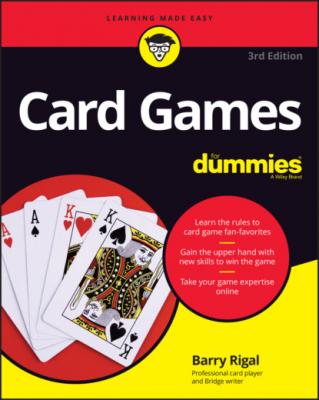ТОП просматриваемых книг сайта:
Card Games For Dummies. Barry Rigal
Читать онлайн.Название Card Games For Dummies
Год выпуска 0
isbn 9781119880448
Автор произведения Barry Rigal
Жанр Сделай Сам
Издательство John Wiley & Sons Limited
When you turn over all the cards into the pile in front of you, you pick up the pile and use it again without shuffling them.
The flipping process continues until one player turns over a card of the same rank as the top card on another player’s pile. As soon as the matching card is revealed, the first person to call out “Snap!” takes the two piles with matching cards and puts them face down under their own pile.
Frequently, two players make the Snap call simultaneously. In this case, you put the two piles with the same card together, face-up, in middle of the table. Everyone continues to turn over the top cards on their piles until someone turns over a card that matches the card on the pile in the middle of the table. The first person to shout “Snap pool!” wins the middle pile. The new piles that are being created are still up for grabs in the usual way, of course. Whenever a pairing is created, the first to shout “Snap” wins them.
The player who ends up with all the cards wins the game.
For some reason, Snap brings out the worst competitive instincts in people, myself included. Establishing several informal rules can avoid Snap-induced bloodshed:
Set rules about the proper way to turn over your card. You can’t turn over the card so that you see it first, which means that you must flip over the card in a continuous, fast motion onto your pile.
Get an impartial witness to decide on all close calls. If you can, choose someone who isn’t playing the game, preferably an authority figure such as an adult.
In Simplified Snap, which is suitable for three or more players, all the players put the turned-over cards on a single pile in the middle of the table. You call “Snap!” whenever the top card on the pile matches the last card played. This method allows you to focus on only one place.
Speed Snap provides a challenge, which makes it better for older players. All players turn over their cards at the same moment so that the reaction process speeds up. To make sure that all the players turn over their cards simultaneously, the umpire (or one of the players) must say “One, two, three!” with all players turning over the cards on three.
Animals
Animals is a much louder version of Snap. To understand the basics of Animals, see the preceding section, “Snap.” The major difference between Snap and Animals is the way you call out for the cards.
Two or more players
A standard deck of 52 cards
Pencils and scraps of paper
At the start of the game, each player selects an animal, preferably one with a long and complicated name, such as duck-billed platypus or Tyrannosaurus Rex. Each player writes the name on a piece of paper and puts it in the middle of the table.
You shuffle the papers around, and every player takes one and then announces the name of the animal. Play can then begin.
When two players turn up matching cards, those players are the only ones who can win the cards. They must each try to call out the other person’s animal name first, and whoever succeeds wins both piles.
Slapjack
Slapjack involves physical agility rather than verbal dexterity and memory, so make sure the players involved are active and eager. Young children can play this game if they can tell the difference between a jack and a king or queen.
Two or more players. A maximum of six is probably sensible or too many collisions may result at home plate.
A standard deck of 52 cards: Slapjack can totally wreck a deck of cards, so don’t break out the collector cards you bought in Las Vegas.
The dealer deals out the entire deck, face-down and one card at a time, to each player in a clockwise rotation. At the end of the deal, each player should have a neat stack of cards in front of them. Make sure you don’t look at your cards.
Beginning on the dealer’s left, each player takes a turn playing a card face-up onto a single stack in the center of the table.
Play continues peacefully until someone plays a jack. Whoever slaps the jack first wins all the cards in the middle of the table and adds them to the bottom of the pile in front of them. The player to the slapper’s left starts the next pile by placing a card face-up in the center of the table.
Spirits run high in Slapjack, so you may need to define some rules before the game starts:
You turn over a card by turning it away from you so that you can’t peek at it in advance. (This puts the turner at a slight disadvantage, but the luck evens out things eventually.)
Rest your slapping hand on the table. Make the player who puts out the card slap with their other hand, which must also rest on the table.
When you can’t decide who slapped first, the hand closest to the jack always wins the day.
After all your cards are gone, you aren’t automatically out of the game; you stay in for one more chance, lying in ambush and waiting to slap the next jack that gets turned over. At that point, if you fail to slap the jack,

